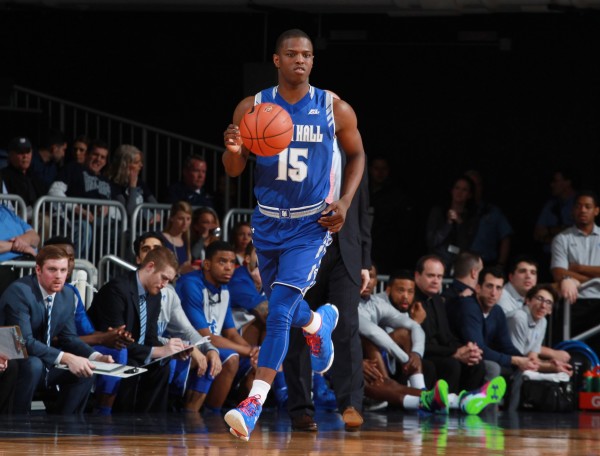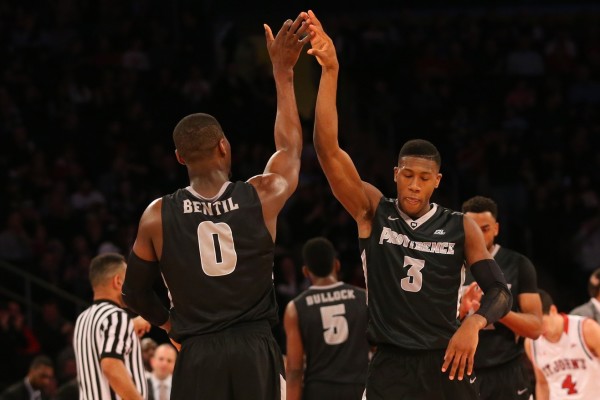Handing Out the Big East Player Awards
Posted by Justin Kundrat on March 8th, 2016Perhaps the best thing about the Big East is its player continuity. With the lone exception of St. John’s, every conference team returned a significant portion of its key contributors from last season, tremendously benefiting the quality of the league as a whole. Moreover, retention allows fans an opportunity to track player growth and development through the years. As an example, four of last season’s six All-Big East first teamers returned to campus this season. Giving an award to one player over several other qualified players is always difficult, but after having watched or attended nearly every Big East game this season, this is one pundit’s take on the Big East’s superlatives.
Player of the Year: Isaiah Whitehead, Seton Hall
Choosing a Big East Player of the Year is always a tough decision, and this year was no different. The award usually goes to the best player on the best team, but as a player of the year award, that means it should go to whomever has the biggest impact on his team. You might say that it is synonymous with most irreplaceable player. Josh Hart is undoubtedly the most important player on the best team in the conference, but Villanova has numerous quality offensive pieces and could find a way to survive in his absence. Kris Dunn completely changes the game on both ends of the floor, but his performance has tapered off in the last few weeks (to an extent because of illness). The toughest decision was to eliminate Ben Bentil, who quite simply played out of his mind while his teammate Dunn was struggling. The final distinction came down to this: Seton Hall drastically outperformed expectations this season and Isaiah Whitehead has been the primary reason why. Without the contributions of Whitehead, the Pirates would be an average team only capable of average things. In concert with Seton Hall’s rise, the sophomore guard has been virtually unstoppable in the last month of play, scoring more than 20 points eight times in his last 10 games. He has also recorded more blocked shots than any other guard in the conference, ranks third in fouls drawn and fourth in assist rate. His biggest development this season has been to exhibit an ability to make his teammates better. The improvement of Whitehead and the simultaneous emergence of Seton Hall as a Big East contender and certain NCAA Tournament team is no coincidence.
Newcomer of the Year: Henry Ellenson, Marquette. Xavier’s Edmond Sumner is a legitimate contender for this award, but Ellenson gets the edge from a statistical and overall impact. Despite a disappointing season for Marquette, the big freshman put together one of the best such years in recent conference history, averaging 16.8 PPG and 9.8 RPG to go along with 1.5 blocks per contest. Perhaps the most impressive part of Ellenson’s game has been how comfortably he has played from the start. Most freshmen take time to develop and begin showing signs of relative comfort around midseason, but Ellenson posted a 21-point, 16-rebound performance in his first collegiate game and never looked back from there. His multi-faceted skill set helped hide an array of holes in a youthful Golden Eagles’ squad whose brighter days are ahead.
Most Improved Player: Ben Bentil, Providence.
Bentil gets the Most Improved Player award and it’s not close. That he received close consideration for Big East Player of the Year after being an average contributor last season says plenty. While the Friars have struggled with consistency down the stretch, Bentil has posted several monster games, including a 31-point, 13-rebound performance in an upset win at Villanova. Even with the multifaceted Dunn on the floor, Bentil has morphed into the focal point of the Friars’ offense, displaying a highly potent inside-outside game that renders him virtually unguardable. With a big man on him, he steps out and shoots a three; with a wing on him, he bullies the smaller defender into the paint. Even in the wake of Dunn’s impending departure, Bentil’s improvement as arguably the best all-around player in the league has kept Providence fans optimistic about the future.
Defensive Player of the Year: Kris Dunn, Providence. Dunn gambles quite a bit on the defensive end but he’s smart enough to know when to take those chances. His long and athletic frame gives him a significant advantage over opposing point guards and his strong defensive instincts are most evident in the steal rate statistic, where he has ranked among the nation’s top six thieves in each of the last two seasons. Perhaps the most important aspect of Dunn’s defense is that it fuels the Friars’ fast break to generate points for a team that struggles in the half-court. While his proficiency has been hampered at times by foul trouble, his defensive playmaking abilities may be the most exciting part of his game.
Sixth Man of the Year: Derrick Gordon, Seton Hall. Gordon could also have won Defensive Player of the Year but Sixth Man of the Year seems more fitting. Most of these award recipients go to players that provide scoring punch off the bench, but that’s not Gordon’s game. Rather, the senior provides Seton Hall with everything it lacks in its sophomore-laden starting lineup: defensive intensity, leadership and a penchant for making big plays down the stretch. Gordon is a defensive showstopper, often tasked with the unglamorous task of harassing the opposition’s best scorer, and his impact there is undeniable. When talking about high expectations for this year’s team, it’s no wonder that head coach Kevin Willard stated that he “thought we’d be really good when I got Derrick Gordon in practice.”












































